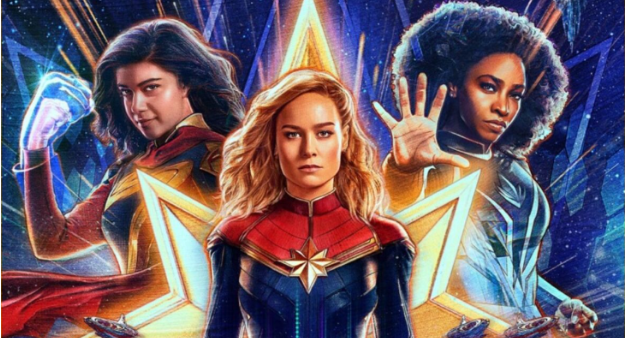It’s been almost 15 years since Marvel studios produced their first movie “Iron Man” on May 2, 2008. Since that monumental moment, Marvel has been a staple in cinema and has made nearly $29.55 billion off of their films.
Recently, however, their newest movie “The Marvels” premiered and made about $46.1 million on its opening weekend, which, to Marvel’s standards, is little more than pocket cash. The movie marks the worst domestic opening for any Marvel Cinematic Universe (MCU) film, and less than a third of the opening weekend total for the 2019 “Captain Marvel,” the film’s prequel.
Many then ask: what went wrong? Is this the classic case of superhero fatigue, the burnout of the same fifteen years of identical plotlines? Was it the fact that many male fans turned away from the movie due to its three female leads, or was it due to the lack of promotion the movie received during the SAG-AFTRA Strike?
The latter seems unreasonable, simply because of the size of Marvel’s typical fanbase.This popularity is further proven by a study conducted this past summer that proved that over 60% of adults ages 18-44 called themselves fans of the franchise.
Why, in a year where the majority of American adults identified as MCU fans, did they not show up to the newest film in the franchise?
Perhaps when something like this happens, companies should take the hint to hang up their coats and move onto something new. But by taking a look at the parent company for Marvel, Disney, it’s easy to find a pattern of hanging on too long to the sweet nostalgia of the past.
In 2019, Disney released its new platform, Disney+, changing the trajectory for Marvel storytelling. For once, the franchise was able to make its own TV shows without having to go through third parties like they had done for “Daredevil” and “Jessica Jones,” both released through Netflix.
Disney+ shows like “WandaVision,” “The Falcon and the Winter Soldier,” “Loki,” and “Hawkeye” became a different source of profit and a different way to produce media for the franchise. The shows’ success came from building off of the events of the films, as opposed to telling barely related stories happening in the MCU like the franchise had previously done with the shows.
The success of some less-than-stellar storytelling in shows became Marvel’s ultimate downfall: the movies became too reliant on the shows, creating a codependency that takes away from the movies altogether.
Now, Marvel essentially forces fans to have Disney+ subscription to understand what is going on, or what character’s motivations are. If you don’t keep up, you are too far behind in the franchise. Granted, you may not always need that much context, but Marvel’s current goal seems to be quantity over quality.
Marvel is digging themselves into a hole that they can’t pull themselves out of. Even one of their most powerful heroes, Captain Marvel, is unable to save the day.




